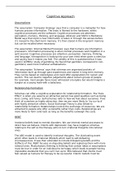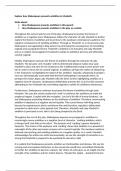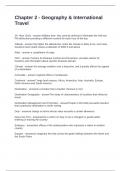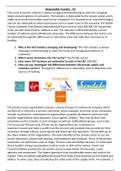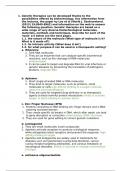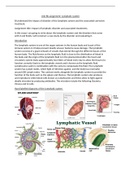Pregnancy-related low back and pelvic pain
1 EVALUATION OF PERIPARTUM LUMBO-PELVIC PAIN
1.1 DEFINITION
1.1.1 Pregnancy-related Pelvic Girdle Pain
- Pain related to posture, movement or load
- Localized in the lumbo-pelvic region
- With or without radiating pain to the legs
- That starts during pregnancy, delivery or up to 9 month post- partum
Definition COST B13
- Pain that is experienced between the posterior iliac crest and the gluteal fold, particularly in
the vicinity of the sacroiliac joints (SIJ), separately or in conjunction with pain in the
symphysis, and that pain and functional disturbances in relation to PGP must be
reproducible by specific clinical tests
1.1.2 Pregnancy-related Lumbo-pelvic pain
- Pain with or without radiation into the legs which was bad enough to limit usual activities or
cause change in daily routines for more than one day
,1.2 TERMINOLOGY
- Pelvic instability
- Sacro-iliac pain deze terminologie niet gebruiken
- Symphiliosis
- Pelvic girdle pain
o Peripartum pelvic pain (PPPP)
o Pregnancy-related Low Back and Pelvic pain)
▪ Up to 78% of women develop PPPP
1.3 LOCALIZATION OF SYMPTOMS
- combinatie!! Goed in het oog houden want dit gaat evolueren naar CPPS -> slechtere
prognose -> sturen naar gespecialiseerde hulp
- Grote groep van de vrouwen heeft vooral pijn thv symfyse en/of SI
1.4 DIFFERENTIAL DIAGNOSIS OF PGP AND PLBP
1.5 PREVALENCE
▪ Variety in prevalence rates
– 25 - 50% of pregnancies (stijgt met de zwangerschappen! Dus ook de miskramen)
– Incidence (48-56%) increases with number of children
, 1.5.1 During pregnancy
- Lumbo-pelvic pain during pregnancy
o Gestational weeks 10-24 (N= 895)
▪ Prevalence of LPP = 55%
▪ On sick leave because of LPP = 4%
o Gestational weeks 28-38 (N = 551)
▪ Prevalence of LPP = 70%
▪ On sick leave because of LPP = 26% (144/551)
1.5.2 Following pregnancy
- Lumbo-pelvic pain following pregnancy
o 33% at 3m post-partum
▪ 17% PGP
▪ 11% LBP
▪ 5% PGP & LBP
▪ From the patients, 40% were moderately disabled (ODI 20-60%)
o 7% at 6y follow up
o 10% up to 10y post-partum
1.6 SYMPTOMS
- Activities of long duration
o Standing, sitting, walking, driving
o Ze kunnen dit wel maar na 30min zullen er klachten ontstaan
- Changes in posture
o Turnover in bed, get in & out the car
- Lifting legs
o Steps, ADL
- Bending trunk forward
o ADL, care of child
- Lifting charges
- Sexual activities
- Catching of the leg
o Steps, ADL
o Kan voor veel angst zorgen bij veel vrouwen: wat als ze door hun benen zakken
wanneer ze het kind vasthebben?
→ Symptoms may shift!!
1.7 EVALUATION
SI is een heel stevig gewricht mede dankzij het ligament
-> bij de zwangerschap moeten deze dus soepeler
worden om te kunnen bevallen
1 EVALUATION OF PERIPARTUM LUMBO-PELVIC PAIN
1.1 DEFINITION
1.1.1 Pregnancy-related Pelvic Girdle Pain
- Pain related to posture, movement or load
- Localized in the lumbo-pelvic region
- With or without radiating pain to the legs
- That starts during pregnancy, delivery or up to 9 month post- partum
Definition COST B13
- Pain that is experienced between the posterior iliac crest and the gluteal fold, particularly in
the vicinity of the sacroiliac joints (SIJ), separately or in conjunction with pain in the
symphysis, and that pain and functional disturbances in relation to PGP must be
reproducible by specific clinical tests
1.1.2 Pregnancy-related Lumbo-pelvic pain
- Pain with or without radiation into the legs which was bad enough to limit usual activities or
cause change in daily routines for more than one day
,1.2 TERMINOLOGY
- Pelvic instability
- Sacro-iliac pain deze terminologie niet gebruiken
- Symphiliosis
- Pelvic girdle pain
o Peripartum pelvic pain (PPPP)
o Pregnancy-related Low Back and Pelvic pain)
▪ Up to 78% of women develop PPPP
1.3 LOCALIZATION OF SYMPTOMS
- combinatie!! Goed in het oog houden want dit gaat evolueren naar CPPS -> slechtere
prognose -> sturen naar gespecialiseerde hulp
- Grote groep van de vrouwen heeft vooral pijn thv symfyse en/of SI
1.4 DIFFERENTIAL DIAGNOSIS OF PGP AND PLBP
1.5 PREVALENCE
▪ Variety in prevalence rates
– 25 - 50% of pregnancies (stijgt met de zwangerschappen! Dus ook de miskramen)
– Incidence (48-56%) increases with number of children
, 1.5.1 During pregnancy
- Lumbo-pelvic pain during pregnancy
o Gestational weeks 10-24 (N= 895)
▪ Prevalence of LPP = 55%
▪ On sick leave because of LPP = 4%
o Gestational weeks 28-38 (N = 551)
▪ Prevalence of LPP = 70%
▪ On sick leave because of LPP = 26% (144/551)
1.5.2 Following pregnancy
- Lumbo-pelvic pain following pregnancy
o 33% at 3m post-partum
▪ 17% PGP
▪ 11% LBP
▪ 5% PGP & LBP
▪ From the patients, 40% were moderately disabled (ODI 20-60%)
o 7% at 6y follow up
o 10% up to 10y post-partum
1.6 SYMPTOMS
- Activities of long duration
o Standing, sitting, walking, driving
o Ze kunnen dit wel maar na 30min zullen er klachten ontstaan
- Changes in posture
o Turnover in bed, get in & out the car
- Lifting legs
o Steps, ADL
- Bending trunk forward
o ADL, care of child
- Lifting charges
- Sexual activities
- Catching of the leg
o Steps, ADL
o Kan voor veel angst zorgen bij veel vrouwen: wat als ze door hun benen zakken
wanneer ze het kind vasthebben?
→ Symptoms may shift!!
1.7 EVALUATION
SI is een heel stevig gewricht mede dankzij het ligament
-> bij de zwangerschap moeten deze dus soepeler
worden om te kunnen bevallen


